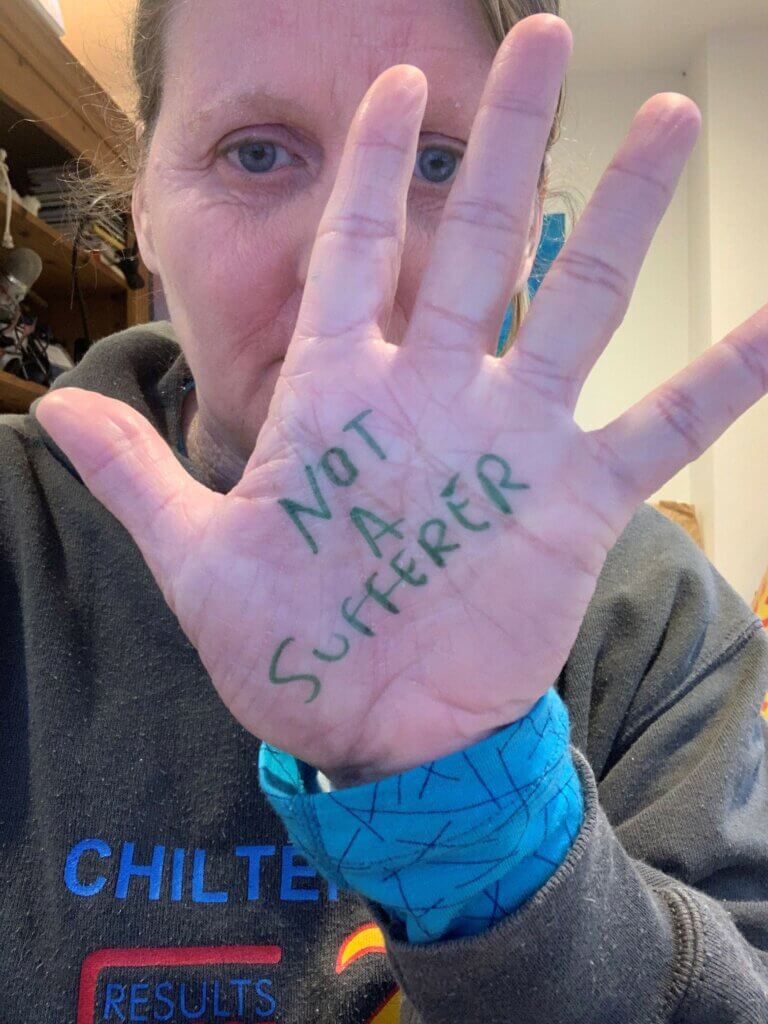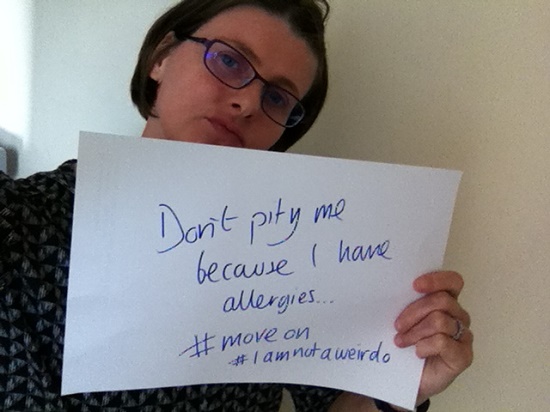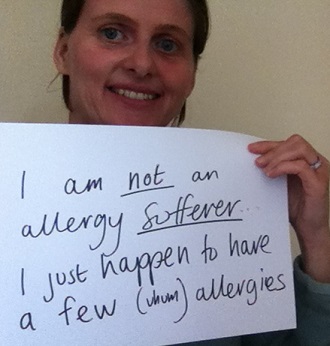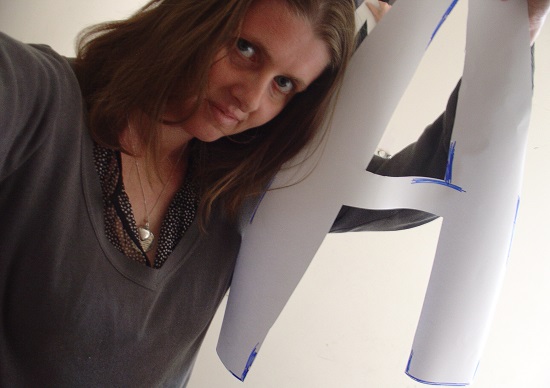If you start to pay attention, you’ll hear people with allergies described as ‘allergy sufferers’ all the time. The same for atopic dermatitis and eczema, the term ‘eczema sufferers’ is used as if the person were in constant pain with the condition. It’s a term that we all need to stop using, because in most cases people really don’t like to be called sufferers.
I understand why people do it, I used to use the term myself, until a BBC journalist explained why it perhaps wasn’t the best choice of words. It’s a lazy word to use, shows little thought, and it’s also a little offensive to the people with the condition being described.

What is a sufferer?
What do we think of when we use the word sufferer?
a person who is affected by an illness or ailment: “a long-term sufferer from depression”
dictionary.com
It infers long term, constant pain and illness which is very often not the case.

Language is so important
It may seem over sensitive to object to words like this being used, but it also doesn’t help the person living with the condition. The language we use in everyday life is so important. If you talk about yourself and say ‘my allergies’ and ‘my eczema’ you are sort of implying it’s yours, and you own it. Instead try to see is as just a condition you are sometimes affected by.
It’s a subtle MindShift but it’s an important one. If we can accept a condition we may be living with and move on, with positivity, to find ways of coping, challenging ourselves and making the most of life and what it has to offer, that mental mindset can make a big difference.
Why we don’t want to be called ‘sufferers’
There can be pain and symptoms for any condition that are hard to live with sometimes. You could call that suffering. Certainly, anaphylaxis causes suffering for many people, and eczema can be a lifetime of itching and discomfort.
But from my own experience, the use of the word sufferer is all wrong. I don’t suffer the conditions I live with, I just get on with it. I don’t want to be seen as a sufferer. I am not in constant pain and take great joy from even the small comforts and experiences in my day-to-day life. The term ‘sufferer’ makes you think someone is perhaps in a constant state of pain and discomfort, that they require our pity because this would be a terrible way to live.
Think carefully and use positive language instead
If you want to write or speak about someone with eczema, you can use inclusive language. It’s a condition that ebbs and flows, we have skin flares but aren’t in a constant state of eczema so how about:
- people with eczema
- allergy reactors
- reacts to x allergen
- people living with anaphylaxis
- the allergic community
- will have a serious reaction if exposed to any trace of allergen
- atopic people
- at risk from anaphylaxis
- And so many more (I’ll add to this list as I think of more)
It’s a similar to the way people often say someone is ‘confined to a wheelchair’ when in fact, most people who use them find them freeing and liberating as their chair allows them access they wouldn’t otherwise have had. They certainly don’t want your pity, they just want respect and access to a normal life.
Check out this Gov.uk page ‘Inclusive language: words to use and avoid when writing about disability’.
What not to say…
Please avoid terms like:
- afflicted
- victim
- sufferer
- sensitive (implies weakness)
- patient (makes people think of hospitals)
- normal skin, normal people – we’re all just normal people!
People are just human beings who find themselves living with different challenges and conditions. It may mean adapting to doing things in a different way, but that shouldn’t always be seen as a bad thing. Think about using more inclusive language like just ‘people living with…’ or ‘a person with x,y,z’
You may find this blog, ‘7 terms not to use to describe mental illness interesting.’
Definitely don’t pity people
People often say things like, ‘what a pity’ this happened, or what a pity you can’t eat this or do that. No one wants your pity and it can come across as condescending, because the person saying it can do or eat the thing. It can often be a constant reminder of what you can’t do.
The language you use yourself can affect how you feel
It can be easy to then feel you are missing out. Instead focus on what you CAN do reframe how you refer to your condition. If you have food allergies, focus on what you CAN eat, not what you can’t. Just think of all the other foods that you’re not allergic to.
Never say, ‘Poor You!’
Finally, ‘Poor you.’ is also a poor choice of words. When surveying a menu or a spread of food, people often say things like, “poor you, you can’t eat any of this.” and whilst it may be true, you don’t want and you certainly don’t need reminding and having it rammed down your throat. It is coming from a place of kindness though, the person saying it can’t imagine how they would cope in your shoes. But it’s unhelpful. If you want to help a person with limited choices, you could ask if they’d like you find a member of staff to help explain what’s safe. If you know someone has allergies and you think their choices are limited, you could ask if they’d like some support asking for some safe food to be provided. It can be hard standing up for yourself sometimes but most people with food allergies are used to this kind of situation and will have come prepared or ordered a safe option. If you’re not sure what to say, you could also just stay quiet and be very grateful you can eat everything on offer.
What is the opposite of sufferer?
There are other words used like survivor, warrior, fighter and champion. These are more positive, but can also sometimes be challenging. When people call someone a fighter or a warrior it can make them feel uncomfortable. People with cancer or other serious life-threatening conditions don’t appreciate words like fight and beating this… I can make people who are worsening and not getting better feel like they are failing in some way and not doing enough to fight and beat the prognosis.
Ttopical steroid withdrawal takes suffering to a new level
The pain, discomfort and utter hopelessness that topical steroid withdrawal causes is indescribable. It really is a condition that causes a lot of suffering with very little acknowledgment and support. The lack of any diagnosis, research, recognition and safeguards for helping people get through it, make this so much harder. There are new drugs coming in that may help, but understandably people are worried about the side effects of these and don’t understand how they work. TSW gives people an innate distrust of any medical solutions put forward. I don’t know what the answer is, but this yawning gap for people struggling with TSW is what causes so much more of the suffering. If the medication had warnings on it explaining withdrawal it would be easier to live with and move forward with a plan for healing.
People are suffering though…
I do get it, I’ve had comments already on my social media posts from people who don’t find the word sufferer offensive at all. There can be a lot of suffering, hardship and challenges that go along with living with allergies, anaphylaxis, asthma and eczema and I’m not downplaying any of that very real suffering. It’s totally OK to not be OK with things and to struggle sometimes, but if you stay in, and live in a place of feeling you are constantly suffering it could mean you just attract more suffering. It’s also not a nice place to be. I know I have struggled with a lot of anger, but now I can understand that passing emotion for what is, a calling to use that passion to make things better and raise awareness of these conditions.
All we need is kindness and empathy
None of this is rocket science, but it does take all of us to see people and their daily challenges and to try to put ourselves in their shoes to understand what they live with day to day. All we really want is respect, kindness and support when we need it. We can all do better.

What do you think? Over sensitive and over thinking?
What do you think? Do you have a problem with how people are described when talking about different disabilities and life limiting conditions. I’d love to hear your thoughts on this. Let’s have a heated debate!
Photo by Alex Green on Pexels












For the first time I would say I have to disagree with you on this issue of not wanting to be called suffering or a sufferer. Ruth. Speaking for myself personally I have MCS that has become so off the scale that because absolutely everyone and everything is literally stunk out with choking perfume /chemical fumes every place I go, I am gasping for breath and now it appears permanently flared up from head to toe with allergic contact dermatitis the manic itching and burning 24/7 from which makes me feel like jumping off a cliff. Am I going to shut myself away? of course not! All I want like yourself is a few simple pleasures like having a cup of coffee etc but can you enjoy anything when you cannot get away from your allergy triggers at any time except indoors? short answer for me NO, every day absolute hell. Therefore if someone uses the term to me allergy sufferer or MCS sufferer, I have no problem with that at all, it accurately describes the situation. To be honest I think people are starting to get very fed up now with this constant policing of the English language and everyone seeing fit to get offended by the most innocuous of comments. I know myself I try to avoid getting into conversations with others when out and about for that very reason, best to keep to yourself wherever possible is what I find, and that is a sad reflection on our society today.
Hi Ruth, great debate! I completely understand. I think for me it’s using the word widescale for wide condition descriptions. Eczema Sufferer, used as a phrase in advertising just triggers me because not all people with eczema struggle daily, as you describe is the case with perfume allergy. There is definitely a place for using the word, I just see it used so often where it may not actually be the best word to use. In your case I can completely empathise, going through topical steroid withdrawal gave me an insight into being bed bound, house bound, in agony and desperate for some respite. That was suffering, and no one seemed to care, there was no support or care from the people who got me into that state.
I’ll give you sufferer and concede the point. Perhaps I need to update the blog! Some conditions, those resulting in significant limitations to life and pain do indeed create huge suffering. I’m so sorry you are still having so much trouble. It is a very sad reflection as you say, I just believe we should all be kind. It costs nothing and is easy to give. The whole body itching is horrendous, I am so sorry you are going through this. I do not understand the obsession with perfumes, and now clothes are washed by main in these forever chemicals that just never stop the clothes from smelling for months. It’s disgusting and horrendous for the environment and you and other with MCS. Take care and I really appreciate you taking the time to comment.